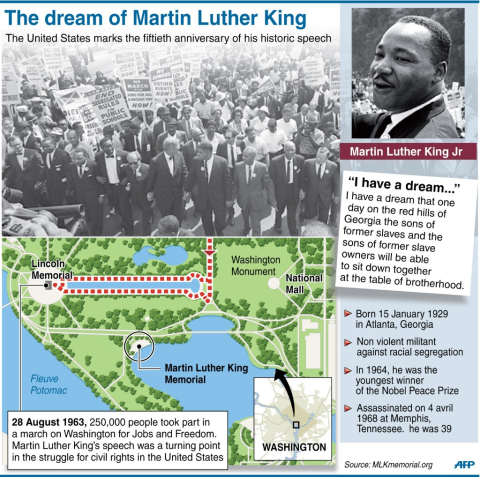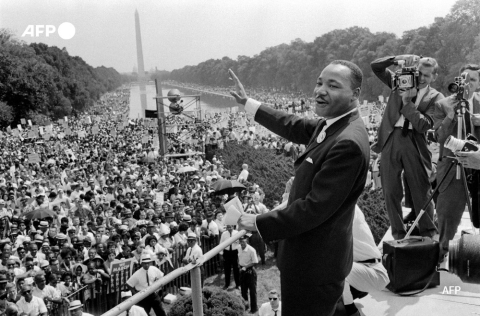'I have a dream': a speech that still echoes

Martin Luther King's inspiring "I have a dream" speech is his most famous and still echoes today.
Here are quotes from the address delivered to thousands of people at the Lincoln Memorial in Washington on August 28, 1963, during the March on Washington.
- King's 'dreams' -
- "I have a dream that one day on the red hills of Georgia, the sons of former slaves and the sons of former slave owners will be able to sit down together at the table of brotherhood."
- "I have a dream that my four little children will one day live in a nation where they will not be judged by the color of their skin but by the content of their character."
- "Let us not seek to satisfy our thirst for freedom by drinking from the cup of bitterness and hatred. We must forever conduct our struggle on the high plane of dignity and discipline."
- Still not free -
- "Five score years ago, a great American, in whose symbolic shadow we stand today, signed the Emancipation Proclamation.
"This momentous decree came as a great beacon light of hope to millions of Negro slaves who had been seared in the flames of withering injustice.
"It came as a joyous daybreak to end the long night of their captivity.
"But one hundred years later, the Negro still is not free. One hundred years later, the life of the Negro is still sadly crippled by the manacles of segregation and the chains of discrimination."
- 'Let freedom ring!' -
- "From every mountainside, let freedom ring! And if America is to be a great nation, this must become true.
"And so let freedom ring from the prodigious hilltops of New Hampshire. Let freedom ring from the mighty mountains of New York.
"Let freedom ring from the heightening Alleghenies of Pennsylvania. Let freedom ring from the snow-capped Rockies of Colorado. Let freedom ring from the curvaceous slopes of California.
"But not only that: Let freedom ring from Stone Mountain of Georgia. Let freedom ring from Lookout Mountain of Tennessee. Let freedom ring from every hill and molehill of Mississippi. From every mountainside, let freedom ring.
"And when this happens, when we allow freedom to ring, when we let it ring from every village and every hamlet, from every state and every city, we will be able to speed up that day when all of God's children, black men and white men, Jews and Gentiles, Protestants and Catholics, will be able to join hands and sing in the words of the old Negro spiritual: Free at last! Free at last! Thank God Almighty, we are free at last!"
- From 'trite' to history -
The AFP story below, written for the 2013 commemoration of the speech, explains that King never planned to say "I have a dream".

WASHINGTON, August 23, 2013 (AFP) - It is the most memorable line from one of history's greatest speeches, yet civil rights leader Martin Luther King never planned to say "I have a dream" when he addressed the March on Washington a half-century ago.
King was the last speaker of the day when he took the lectern on August 28, 1963 and looked out over the unprecedented crowd of 250,000 that filled the National Mall for the March on Washington for Jobs and Freedom.
In the hands of the oratorically gifted Baptist preacher from Georgia was a text that he and his associates had painstakingly finalized the night before. The phrase "I have a dream" was not in it.
"For all King's careful preparation, the part of the speech that went on to enter the history books was added extemporaneously while he was standing on the steps of the Lincoln Memorial, speaking in full flight to the crowd," wrote US-based columnist Gary Younge of Britain's Guardian newspaper in an excerpt of his new book "The Speech".
- 'Tell 'em about the dream' -
King had used the "I have a dream" line before, including in a sermon in Detroit recorded by Motown two months earlier. But King's adviser Wyatt Walker counselled against its re-use, contending it was "trite" and "cliche" and basically unworthy of a nationally televised event.
King, introduced to the National Mall rally as "the moral leader of our nation," himself told graduate student Donald Smith later that year that he had "just all of a sudden" decided on the fly to invoke the dream.
He might have been swayed on the spot by Gospel singer Mahalia Jackson, who performed earlier in the day, when she shouted out at him: "Tell 'em about the dream, Martin!"
"I just felt I wanted to use it," King told Smith, who went on to write a Ph.D. dissertation about King's powerful use of persuasive speech. "I don't know why. I hadn't thought about it before that speech."
Sixteen minutes long, the speech became even better known as King's virtual epitaph after he was shot and killed on the balcony of the Lorraine Motel in Memphis, Tennessee in April 1968 by a white sniper across the street.
But it wasn't just what King said that hot summer day in Washington, but who was listening and watching on live radio and television.
"For the first time a mass white audience heard the undeniable justice of black demands," said Julian Bond, then chairman of the National Association for the Advancement of Colored People (ACP), quoted in Smithsonian magazine in 2003.
King himself remembered the March on Washington as "that radiant August day."
